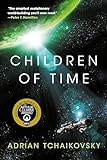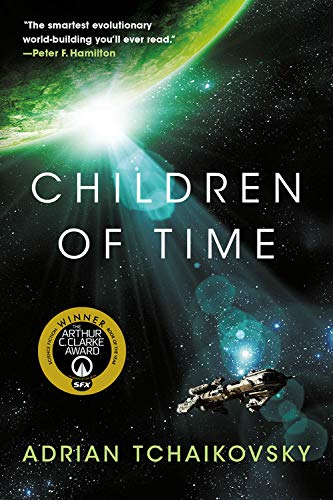Spiders have taken over my backyard. They are huge and multicolored; yellow, red, black, brown. They perch in their webs, which they weave from the lemon tree to the agave, the hibiscus to the aloe. Some of their gossamer glitters with early morning dew but is gone by the blazing heat of the LA afternoons; the rest remains wrapped around the cacti day after day, like sticky blankets. It gives the yard a haunted, neglected look. It’s their garden now.
In Adrian Tchaikovsky’s Children of Time, Earth is uninhabitable and humans terraform other planets. On one of these new worlds, a virus with the power to speed up evolution finds an unexpected host: spiders. Over the next several thousand years, the virus turns them from simple arachnids into unrecognizably intelligent beings. The spiders are individuals, though their stories are told through archetypes that appear in each generation and represent qualities like power, social progress, and scientific advancement. Their collective knowledge is called Understandings, and it—as well as the virus—is embedded in their DNA. The spiders have language, technology, laws, science, religion. They have cities made of webs, woven in trees—not unlike the webs in my own garden.
Earth is uninhabitable and humans terraform other planets. On one of these new worlds, a virus with the power to speed up evolution finds an unexpected host: spiders. Over the next several thousand years, the virus turns them from simple arachnids into unrecognizably intelligent beings. The spiders are individuals, though their stories are told through archetypes that appear in each generation and represent qualities like power, social progress, and scientific advancement. Their collective knowledge is called Understandings, and it—as well as the virus—is embedded in their DNA. The spiders have language, technology, laws, science, religion. They have cities made of webs, woven in trees—not unlike the webs in my own garden.
In Tchaikovsky’s novel, the spiders leave their planet and go out into space. In the summer, the spiders from my garden start to come inside. And once they’re in our space, it’s my wife’s job to take them back out, to their own homes. She climbs up on chairs, windowsills, tables. She stretches up to reach the highest corners, crouches down to get to the furthest nooks. She places a glass over the spiders and slides a piece of paper underneath, carefully carrying them back to nature while I hide inside with a blanket over my head. I don’t know that we ever talked about this being her job. It was sort of implied, the way many roles seem to settle over any couple. She takes the spiders out because I can’t. While she feels bad for our little eight-legged invaders, I’m inordinately afraid of them. The fear feels ancient and evolutionary; an Understanding in my DNA.
*
Like part of a web, my identity is tethered to my family, in which I am one of three girls—to this day, our mom still lovingly addresses us in a single unit as “Girls.” As in: “Girls: Please tell me what kind of milk you want.”
In the ’90s in Rhode Island, perhaps to keep our shrieking to a minimum while she drove, my mom introduced us Girls to Monica: the spider who had taken up residence in her Volvo station wagon. Monica was my mom’s friend, she explained, and therefore not scary. Without hesitation, we bought it. Over the next few weeks we said hello to Monica when she appeared over the glove compartment. We even made up a theme song for her.
My mom, I’d find out years later, was far more afraid of spiders than we were, stemming back to the time she was bitten by a venomous brown recluse. But when Monica (not a brown recluse, but too large to ignore) moved into the Volvo, my mom knew couldn’t shriek alongside us, lest our mutual hysteria become a traffic hazard. So she found a way to hide her fear, and in doing so, also alleviated ours. She’d magically turned Monica into a girl, like us, simply by giving her a name.
One morning that summer I woke up feeling like I had the flu. I had a headache, but it was an odd one, only in the back of my head. We parted my hair and found a huge welt, swollen and painful to the touch. I was sick enough to need to go to the hospital, where they couldn’t figure out what sort of spider had bitten me. (It did not occur to me that it could have been Monica—she was not the biting kind; she was our friend). They gave me antibiotics, but no answers.
They asked questions, though. At the hospital a doctor had said: “Spiders live in crevices. Do you hang out in crevices? Maybe fall asleep in one?” In fact, I had. I’d taken to sleeping on the hard edge of my bed frame, squeezed between the side of the mattress and the wall. I liked being squished, feeling contained. Would I have felt less safe if I’d know the spider was there, too? If I’d known I’d be bitten? And what did the spider think—had my presence been perceived as a threat?
To spiders, humans must look giant and alien, though their modes of perception are so different from ours that it’s hard to imagine how they experience anything at all. Rather than relying on sight and sound, they use vibration, touch, and taste (except jumping spiders—those can see quite well). Spiders do feel fear, though, something we have in common with them. And though the Girls weren’t scared of Monica, she must have been terrified of us, hanging above the dashboard, the sensitive hairs on her legs racked by the vibrations of our well-intentioned theme song.
Children of Time, like most great science fiction, works because it gets the reader to feel empathy for the Other by recasting beings that appear threatening as relatable. In some sci-fi, acceptance happens naturally over time, but Tchaikovsky’s humans are impelled to accept the Other. In the end, as they try desperately to kill the spiders, the spiders have a different strategy. Rather than striking back, they infect the humans with the same virus that has allowed them to think on higher levels. Suddenly, the humans have the capacity to see the truth: We’re not so different. Everything that lives is worthy of its life.
In real life, and without an empathy-inducing virus embedded in my DNA, it’s hard not to place more value on some living things than others. After my dog died, I stopped eating meat once I realized how much she had resembled a goat, a cow, a chicken, a pig. But spiders? When my wife isn’t home to take them outside, I kill them. I vacuum them up. I can’t tell if they’re intelligent, if they have unique personalities. They just hunch in nooks and crannies feeding off gnats, yet another invasion we can’t seem to get under control. I think of Monica, of the name that made her a girl that made her like me. What about the gnats—do they have girl names? Is gnat short for Gnatalie? The spiders don’t answer questions. They just continue to quietly catch the Gnatalies with their webs in the windowsills, the floorboards, the corners; a good reason to let them stay.
The thing is, I would just really rather not be bitten by a spider again. What a horrible, painful experience, even as it healed. Eventually the bite turned purple, split down the middle, oozed orange, crusted over. It was, though, kind of fun to pick the crust out of my hair.
*
Recently, I saw a Daddy Long Legs lurking in the corner of the bathroom while I brushed my teeth. “Spider,” I pointed, when my wife came in to do her own bedtime routine.
“I’m off the clock,” she said. I couldn’t argue. It was late, and dark out. She’d already taken so many spiders out of the house.
I had just finished Children of Time, and though I was sassing her for leaving the spider where it squatted, I wasn’t all that worried about it. Could this spider broadcast math problems into space? Unlikely. But did it have a name? Was it related to Monica? At the very least, maybe it, too, was a girl or—more likely—one of many Girls.
Perhaps the book had finally unlocked the Understandings I inherited from my mother that tenderness toward spiders is possible if you can think of them as living things not unlike you; that the best way to stop fearing that which seems alien is to name it; that even creepy things that crouch in corners can have sisters.
By morning, the spider was gone.



